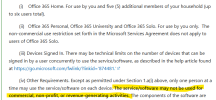River Valley Computer
Well-Known Member
- Reaction score
- 803
- Location
- Russellville, AR
We are VERY inexperienced in the function of Microsoft ESU. This is the first time we have to use it. We have a auto repair center that have 3 computers barely 5 years old and will not run Windows 11. We suggested doing the ESU thing to buy them some time to save up for new computers. Can each computer use the same user name for all three or do we need to create three separate user accounts and three serarate email addresses? Thi has got us bumfugeled. HELP PLEASE.


